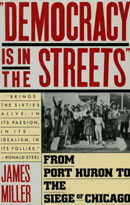
Democracy is in the Streets
From Port Huron to the Siege of Chicago
Miller, James
Publisher: Touchstone/Simon & Schuster, New York, USA
Year Published: 1987
Pages: 431pp Price: $9.95 ISBN: 0-671-66235-X
Library of Congress Number: HN90.R3M47 1987 Dewey: 378'.1981
Resource Type: Book
Cx Number: CX3754
A thoughtful and evocative history of the American New Left in the 1960's, looking critically but sympathetically at the struggles and passions of that period.
Abstract:
James Miller presents a thoughtful and evocative history of the American New Left in the 1960's, looking critically but sympathetically at the struggles and passions of that period. Among the most valuable parts of the book is Miller's detailed description of the organizing efforts of the early New Left, on the campuses, in the anti-war movement, and in the cities. A central theme of the book is "participatory democracy", with the different interpretations that came to be given to that term. To one leading activist, it meant "number one, action; we believed in action. ... Active participation. Citizenship. Making history." To another, it "meant an exciting transformation of the meaning of socialism. Not just that it was another code word for socialism, it meant redefining the socialist tradition in terms of the democratic content of it. It meant extending principles of democracy from the political sphere to other institutions, like industry, like the university." Miller writes that "the meanings of participatory democracy multiplied. By 1964, it had indeed come to mean for many activists rule by consensus; by 1965, it was being widely discussed as a radical alternative to representative institutions."
In looking at the failings of the sixties New Left, Miller quotes Richard Flacks, who believes that the New Left ultimately disintegrated as a coherent force because of its inability to extend its middle-class base, its preoccupation with immediate "revolutionary apocalypse" rather than long-term organizing, its failure to develop a durable organizational structure. Flacks, still an activist, also wryly comments that "It seemed perfectly natural at that time that we'd know better than these old people. After all, they'd failed. It was obvious. And it somehow seemed intuitively right that if you were younger, you know more than people who were older. Now that I'm older, I think that it's absurd."
Miller documents the lasting legacies of the New Left, including the role it played in the development of the modern women's movement, and concludes that there is still a great deal we can learn from the New Left experience.
[Abstract by Ulli Diemer]
Table of Contents
Introduction
Port Huron and the Lost History of the New Left
Part One
Rediscovering Politics
Chapter One: Out of Apathy
On a Different Track
Michigan's Multiversity
Creeping Socialism
Act Now
From Protest to Radicalism
Chapter Two: On the Road
Faith
Rebellion
Commitment
The Art of Political Discussion
Witness to a Revolution
Part Two
Taking Democracy Seriously
Chapter Three: Politics and Vision
Democratic Analysis
If Not Now, When?
Political Stickball
Personal Ties
Chapter Four: The Prophet of the Powerless
Outside the Whale
The Public in Eclipse
A New Moral Optic
Taking It Big
Chapter Five: Building a House of Theory
Defining an Ideal
Doubts about Democracy
Theories of Action
A Re-assertion of the Personal
Promoting Political Controversy
Chapter Six: Port Huron
Setting the Stage
Fathers and Sons
The Spirit of Face-to-Face Politics
Agenda for a Generation
A New Beginning
Chapter Seven: Beyond the Cold War
Invitation to an Inquest
Lockout and Appeal
Growing Up Red
Ignorance and Autonomy
An Uneasy Truce
Chapter Eight: Participatory Democracy
Speaking American
A Conflict of Interpretations
Beyond the Bewildered Herd
A Muffled Tocsin
The Uses of Ambiguity
Part Three
Building a Movement
Chapter Nine: An Intellectual in Search of a Strategy
The Politics of Social Science
At Odds
Taking
Stock
In Search of a Strategy
History as a Way of Learning
A New Era
A Living Document
Port Huron Revisited
Radical Pluralism
Blowin' in the Wind
Chapter Ten: An Organizer in Search of Authenticity
The Vita Activa
An Intellectual Movement of the Poor
War on Poverty
Fragmentation
Chimes of Freedom
Experiments in Organizing
In Search of Authenticity
Reinventing the Neighborly
Community
The Limits of Face-to-Face Politics
Chapter Eleven: A Leader in Search of Legitimacy
The Tradition of Debs
The Secret of Vietnam
Zen Koans and New Recruits
The Birth of the Anti-War
Movement
Escalation
The First March
Revolutionary Symbolism
Media Images
Anti-Politics
Internal Democracy
Getting
Attention
Chaos
Conflict
Red-Baiting
In Search of Legitimacy
Like a Rolling Stone
An Ending
Chapter Twelve: A Moralist in Search of Power
A Wager
Let the People Decide
The Other
Side
A Socialism of the Heart
Ambition Unbound
The Fire This Time
Fantasies of Revolution
We Are All Viet Cong
Rituals of Confrontation
In Search of Power
Shadow Ambassador
Facing Reality
Bringing the War Home
Tears of Rage
Democracy Is in the Streets
The Struggle Begins
The Whole World Is Watching
Incognito
Lost
Conclusion
A Collective Dream
Appendix
The Port Huron Statement
A Note on Sources
Notes
Acknowledgments
Index
Subject Headings


